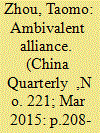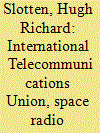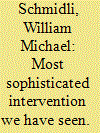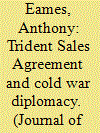|
|
|
Sort Order |
|
|
|
Items / Page
|
|
|
|
|
|
|
| Srl | Item |
| 1 |
ID:
139552


|
|
|
|
|
| Summary/Abstract |
From 1960 until 1965, the People's Republic of China (PRC) built a remarkably cordial quasi alliance with the Republic of Indonesia. At the same time, however, the years between 1960 and 1965 were marked by two large waves of anti-Chinese movements in Indonesia. Although more than half a century has passed since these events, our understanding of Chinese foreign policy towards Indonesia during these turbulent years remains incomplete. In 2008, the Chinese Foreign Ministry Archives declassified for the first time documents produced during the years between 1961 and 1965. However, very recently in summer 2013, the Chinese Foreign Ministry Archives re-classified the main body of its collection. Through examining this body of fresh but currently inaccessible official records, this article aims to bridge the gap between scholarly works on the PRC's diplomatic history and overseas Chinese history. By tracing the processes by which Chinese diplomats dealt with Sukarno, the ethnic Chinese in Indonesia, and the Communist Party of Indonesia (Partai Komunis Indonesia, or the PKI), this article argues that the ambivalent Chinese alliance with Indonesia was shaped by three disparate pressures which interacted and competed with one another: the strategic need to befriend Third World countries, ethnic ties to the Chinese in Indonesia and ideological commitment to the international communist movement.
|
|
|
|
|
|
|
|
|
|
|
|
|
|
|
|
| 2 |
ID:
123839


|
|
|
|
|
| Publication |
2013.
|
| Summary/Abstract |
This article examines the role of the International Telecommunications Union (ITU), a specialized agency of the United Nations, in the international effort to manage the radio spectrum. The management of the radio spectrum has been one of the most important activities of the ITU. International agreements for the use of the radio spectrum have been necessary because radio waves do not simply stop at national borders. Governments have viewed the spectrum as an international common resource.Specifically, this article focuses on the development of radio spectrum policy for one of the most significant new radio "services" of the twentieth century: radio transmissions involving outer space. Crucial ITU administrative radio conferences in 1959 and 1963 organized especially by the United States laid the foundation for the Cold War space race. A focus on the efforts by the United States to manage the meetings is particularly important for gaining a deeper understanding of Cold War diplomacy and international relations during this crucial period. In the context of total cold war, diplomacy was closely linked to a broad range of national security concerns, not only military preparedness but also the symbolic and material struggle over hearts and minds. A central concern of the early efforts to arrive at international agreements for space frequencies was satellite communications. The United States was particularly concerned about convincing the international community to set aside large blocks of frequencies for a planned global satellite communications system that would serve multiple national security objectives. The global satellite system would, in turn, play an important role in convincing other countries to agree to set aside frequencies for all forms of space communication.
|
|
|
|
|
|
|
|
|
|
|
|
|
|
|
|
| 3 |
ID:
111567


|
|
|
|
|
| Publication |
2012.
|
| Summary/Abstract |
In May 1977, in a public forum, President Jimmy Carter laid out the foundations of a distinctive foreign policy programme for the United States. He offered a striking shift away from the Cold War realpolitik of previous American administrations. Human rights, he declared, would be a central component of United States foreign policy. The growing instability in Central America, especially in Nicaragua, during Carter's term of office provided a major test of his Administration's new programme. And its ultimate response to Nicaraguan instability thus provides key insight into the strengths and weaknesses of the thirty-ninth President's attempt to move beyond traditional, hard-line Cold War diplomacy.
|
|
|
|
|
|
|
|
|
|
|
|
|
|
|
|
| 4 |
ID:
151309


|
|
|
|
|
| Summary/Abstract |
The U.S. sale of Trident submarine-launched ballistic missile technology to Britain in 1982 resolved doubts that had emerged in the 1970s about the importance, durability, and strength of the Anglo-American nuclear partnership. But the Trident Sales Agreement did more than bring the “special relationship” out of the doldrums. It became an integral part of an Anglo-American agenda that bolstered North Atlantic Treaty Organization (NATO) unity in the face of Soviet efforts to undermine the alliance’s nuclear objectives.
|
|
|
|
|
|
|
|
|
|
|
|
|
|
|
|
|
|
|
|
|